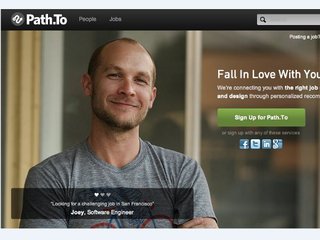DUOS expands AI capabilities to help seniors apply for assistance programs
It will complete and submit forms, and integrate with state benefit systems
Read more...
Path is almost like a social network experiment. Built around exclusivity, it originally only allowed users to have a maximum of 50 friends, the limitation being meant to foster greater connections between people, and to encourage the sharing of more personal information.
The idea is that people will only choose those that are closest to them, and will feel more comfortable telling those people more personal things about themselves, creating a more personal kind of social network.
So now that Path 2.0 went and upped the friend limit to 150, are people still only connecting with those closest to them?
At the TC Disrupt conference in San Francisco Monday, Path co-founder Dave Morin said, despite the uptick, most users now hover around 40 friends, which he called “an interesting piece of anthropological learning."
When the limit was 50, people generally had 10 to 15 friends, which Morin says is the “inner inner circle.” By expanding the network out, Morin says that Path achieved the network it desired.
“We kind of believe that 50 is the perfect network.”
Path 2.0 seems to have been a success on multiple levels, as Morin now says that the site has more than 3 million downloads, and over 50% of its users actively engaged with the site.
Path usage is currently growing in the United States, with China recently becoming the home to Path’s second largest userbase.
Photo sharing and Thoughts are the most widely used types of content sharing on Path, with Sleep becoming surprisingly popular, until it was recently overtaken by Music.
Privacy on Path
Morin called privacy one of Path’s “core values”and stated that the site seeks to always have the user be in control of his or her own privacy, and that extends to how Path content is syndicated to other networks, including Facebook and Twitter.
“We like to use the metaphor that Path is your home inside of Facebook city, where Twitter is the information news network,” Morin said.
“When you think about your home, you can be inside, or you can pick up your phone or walk out the door. There are a different set of rules inside than outside. We think of privacy in terms of control, and on Path, only you control your expression on the network.”
When content is sent to another network, it is posted exactly as the user would expect it to.
“When we package up a piece of content, and send it off onto another network, we don’t try to do anything fancy with it. We don’t try impose our views.”
Morin on mobile
What Morin seems most excited by, in terms of the future of technology, is mobile giving people the ability to always be connected.
Morin declared the PC, “as a concept, as a product in the world, you can actually make an argument that it was a failure,” while calling the mobile device, “the most successful technology platform in history,” something that has only become clear this year.
“There are more people with mobile devices in the world than with toothbrushes. There’s more with mobile devices in the world than the computer by a factor of four.”
So it should not be surprising that Path is starting to think of developing a tablet app, which he says he is giving serious thought to putting on Windows Phones,
“We finally have a computer that’s in every person’s hand, not just on every person’s desk.”
San Francisco-based Path was founded by Napster developer Shawn Fanning and former Facebook executive Morin. After receiving $2.5 million in seed funding, Path then raised $8.65 million from Kleiner Perkins Caufield & Byers, Index Ventures, Digital Garage Japan and First Round Capital in February 2011. In April of this year it raised $30 million from Greylock Partners, Redpoint Ventures, Jerry Murdock , Sir Richard Branson, Mark Pincus, Yuri Milner, Allen & Company and existing investors.
Watch Dave Morin's entire interview below:
It will complete and submit forms, and integrate with state benefit systems
Read more...The bill would require a report on how these industries use AI to valuate homes and underwrite loans
Read more...The artists wrote an open letter accusing OpenAI of misleading and using them
Read more...

